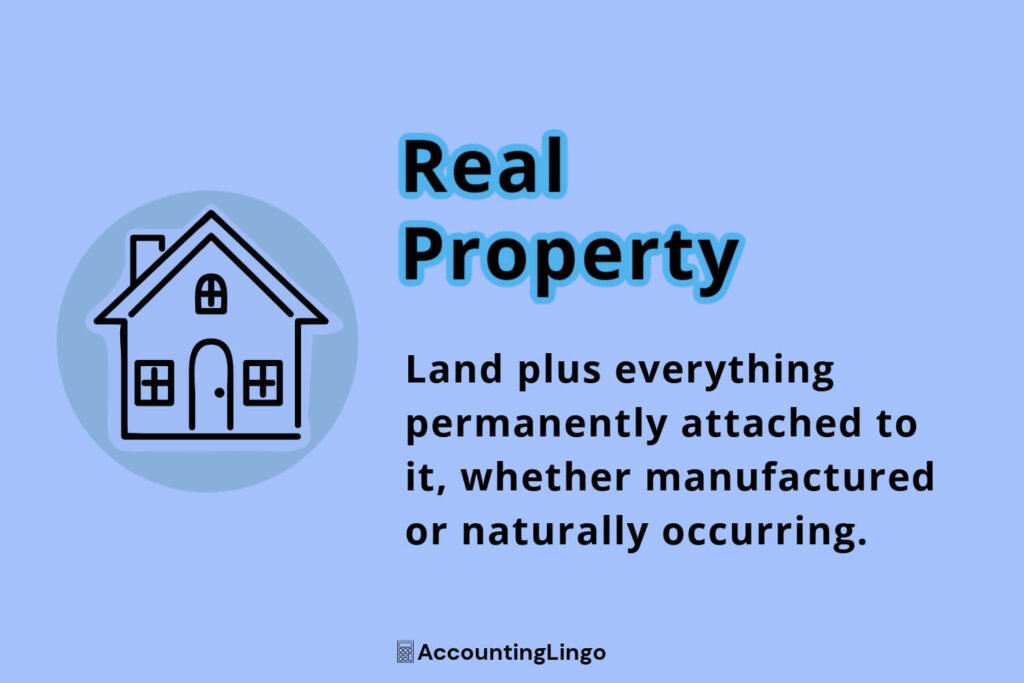
Whether you’re a first-time homebuyer, a curious investor, or simply looking to expand your knowledge, this guide will provide you with a basic understanding of real property.
From understanding the different types of properties and their classifications to exploring the intricacies of property ownership and legalities, our explanations will simplify the jargon and provide you with actionable knowledge.
What is Real Property?
The definition of real property includes- land plus everything permanently attached to it, whether manufactured or naturally occurring. Land can be further described as the surface layer that extends down towards the center of earth and upward into the sky forever.
Real property is also used interchangeably with the term real estate however, real property is generally known to be a broader concept. It also includes rights that go along with property ownership, such as mineral rights, air rights, and water rights.
Types of Real Property
There are a number of real property types. It’s important to understand these different types as it forms the foundation of your knowledge surrounding this topic. Let’s look at some real property examples:
Residential Real Property
Residential real estate refers to properties designed for living purposes. This includes single-family homes, condominiums, townhouses, and apartment dwellings. Residential real estate is additionally classified into what we call: primary residences, second homes, and investment properties.
Commercial Real Property
Commercial real estate encompasses properties used for business purposes. This involves office buildings, retail spaces, industrial warehouses, and hotels. Furthermore, commercial real estate is needed by the world economy as it provides areas for businesses to operate and grow.
Industrial Real Property
Industrial real estate refers to properties used for manufacturing, production, storage, and distribution. This commonly includes factories, warehouses, distribution centers, and industrial parks. These locations are a necessary part of supply chains and play a large role in many industries.
Property Ownership & Control
Now that we’ve defined different real estate types, let’s review the concept of ownership and control. Anyone involved in the industry should have a basic understanding of these terms.
Freehold Estates
These estates involve ownership for an indefinite amount of time.
- Fee Simple, sometimes known as absolute ownership, is the highest legal form of property ownership. It grants the owner total rights and control over real estate, which includes the right to sell, lease, or transfer. Upon death, the owner’s heirs inherit the estate.
- Life Estate is ownership limited to the lifespan of the owner or another designated party. Life estates aren’t considered to be estates of inheritance, unlike fee simple.
Non-Freehold Estates
These estates involve leases (non-ownership control) and are not conveyed to heirs upon death.
- Tenancy at Will involves a lease that can be terminated by an owner or a tenant at any time. It is sometimes referred to as an estate at will.
- Tenancy for Years is created with a lease specifying beginning and end dates which automatically cancels upon completion. It’s also referred to as an estate for years.
- Tenancy from Period to Period exists during a specified period of time, like tenancy for years however, it renews automatically indefinitely unless terminated by the tenant or owner. It’s also known as a year-to-year estate.
- Tenancy at Sufferance is created when an individual who formerly had rights to a property does not vacate when required to do so. This typically occurs when a tenant remains on the property illegally after their lease expires, also referred to as an estate at sufferance.
Agents & Broker’s Role
Real estate agents and brokers are deeply involved in the buying and selling of properties. They act as intermediaries throughout the process, providing expertise and guidance.
Real Estate Agent
A real estate agent is a licensed professional who represents buyers and sellers in real estate transactions. They help clients find suitable properties, negotiate offers, and manage the paperwork involved throughout the buying or selling process. Furthermore, agents most often work under the supervision of a real estate broker.
Real Estate Broker
Licensed real estate brokers have completed additional training and education. They can work independently or hire agents to work with them. In addition, brokers have a higher level of responsibility and oversee many real estate transactions their agents conduct.
Dual Agency
Dual agency exists when a real estate agent or broker represents both the buyer and the seller in a transaction. While it may seem convenient, dual agency may raise ethical concerns as the agent or broker must balance the interests of both parties.
It’s important to understand the implications of dual agency and consider seeking independent representation if desired.
Buying & Selling Real Property
Buying or selling can be an exciting but complex process. Understanding the steps involved can help you make better informed decisions.
1. Preparing to Purchase or Sell
Before beginning a search or selling real property, it’s important to assess your financial situation. Defining your needs and preferences, and setting a budget is essential. For sellers, this likely includes preparing the property for sale, completing repairs or renovations, and staging the home to entice potential buyers.
2. Finding a Property or Buyer
For buyers, the next step is to search for suitable properties that align with their requirements. This can involve browsing online listings, attending open houses, and collaborating with a real estate agent to understand all options. On the other hand, sellers need to market their property effectively to attract interested buyers.
3. Making an Offer or Negotiating
Once a buyer locates a property they wish to purchase, making an offer to the seller is the next step. The offer may include conditions such as financing contingencies or home inspections. Sellers can either accept the offer as is, counteroffer, or reject it. Negotiations commonly take place until both parties reach an agreement.
Taxes, Insurance, & HOA
Property tax and insurance are important considerations that impact your financial obligations.
- Property Taxes are paid on the assessed value of real estate. Local governments commonly collect taxes to fund public services like schools, roads, and infrastructure. Additionally, the amount of tax charged varies depending on the location and value of the property.
- Property Insurance protects owners against potential risks and damages. This can include coverage for natural disasters, theft, liability, and other hazards. Property insurance is essential to safeguard your investment and provide financial protection in case of unforeseen events.
- HOA Fees are recurring payments made by property owners to cover the maintenance and management of shared amenities and common areas. Property is sometimes part of a homeowners association (HOA) and requires such fees. Before purchasing, understanding HOA fees and rules if applicable, is essential.
Real Property Legal Issues
Real estate transactions can involve various legal issues and complexities. Understanding these legal aspects is crucial to protect your interests and ensure a smooth transaction.
Title & Ownership Disputes
Title disputes can arise when there are competing claims for a property’s ownership. These disputes can result from unclear or conflicting property records, fraud, or errors in documentation. Furthermore, resolving title disputes may require legal assistance and can delay the buying or selling process.
Contracts & Disclosures
Real estate transactions include legally binding documents that outline the terms and conditions of a sale. It is important to understand these documents are contractual obligations. One must also ensure that all necessary disclosures have been made. Moreover, failure to comply with these obligations or disclose requirements may lead to legal disputes.
Zoning & Land Use Regulations
Zoning and land use regulations dictate how properties can be used and developed. Regulations may vary depending on the location and impact of a property’s value and potential uses. Researching and understanding what zoning and land use regulations are is essential before purchasing or developing real properties.
Key Terms & Definitions
As you navigate the topic of real property, you’ll encounter various terms and jargon. Understanding such terms can help you make better sense of the industry and allow you to communicate more effectively with professionals.
- Appraisal is an official evaluation of a property’s value conducted by a licensed appraiser. An appraisal is commonly required as part of a real estate transaction in order to determine the property’s fair market value.
- Inspection is another form of property evaluation commonly completed by a licensed home inspector. As soon as the inspection is complete, the inspector provides a report that outlines any health or safety hazards, suggested repairs, or cosmetic imperfections they noticed.
- Mortgage is a loan type commonly used to finance real property. It consists of a note and deed of trust. Additionally, the property itself serves as collateral for the mortgage loan, and the borrower makes regular payments to repay the mortgage over time.
- Escrow refers to a neutral third party that holds funds and important documents during a real estate transaction. An escrow agent is responsible for ensuring that all conditions and requirements have been met prior to releasing funds and concluding the transaction.
Real Property vs Personal Property
From a legal standpoint, there is an important distinction between real and personal property. Real property involves immovable assets like land, any permanent structures or improvements on the land, and the rights that go along with land ownership.
In contrast, personal property involves movable assets that are not considered part of the land. This could include items like clothing, furniture, vehicles, boats, and other movable items not attached to the land.
Resources for Further Learning
The real property industry is large and constantly evolving. A variety of resources are available to help you gain additional insight and expand your knowledge.
Courses & Certifications
Many educational institutions offer real property courses and certifications covering a wide range of topics, like basic principles to advanced strategies. Courses can provide specialized knowledge and credentials to enhance your real estate career.
Industry Publications & Books
Industry publications and books written by knowledgeable experts in the field can be a source of additional information. A variety of data regarding real estate trends, strategies, and best practices is readily available. Therefore, subscribing to industry magazines or joining professional associations may help you stay up to date with current developments in the industry.
Online Communities & Forums
Engaging with online communities and forums dedicated to real property can be a valuable source of information and networking opportunities. Participating in discussions, asking questions, and sharing experiences can help you gain insights from experienced professionals and fellow enthusiasts.
Conclusion
As you continue your real estate journey, always seek further knowledge and stay updated with the industry’s ever-changing landscape. We hope this beginner’s guide has empowered you with a basic understanding of real property.
Additional Resources
Other helpful articles may include:
What is a Right of Use Asset?
Understanding Liabilities
What are Assets?
